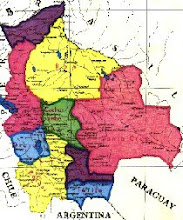Horrid errors from
the horde of hacks...
(This will be a recurrent feature, focusing only on things in the international press that are flat wrong, while turning a blind eye to exaggerations, irrelevancies, misconstruals, errors of omission, and other relatively minor matters.)
Flat Wrong: From CNN, May 14:
"Morales also favors a national referendum on changes to the constitution, under which the central government would be further emphasized at the expense of the current system, which gives relative autonomy to the country's departments. "
The Truth: The current system gives almost no control to the country's departments. A Bolivian at present must deal with the national government to start a business, form an association, get a national ID card, pay parking tickets, get a high school transcript, or, well, do almost anything. It is one of the most centralized governmental arrangements on the face of the earth. That's one reason why there is so much enthusiasm for autonomy. And President Morales is not seeking to change or amend the current constitution; he is seeking to replace it with a new one that, incredible as it may seem, actually increases central authority.
Flat Wrong: Newsweek, April 14, "One Sure Thing: Death to Taxes" by Mac Margolis. "Much of Bolivia's recent upheaval centers on La Paz' attempt to stop wealthy provinces in the fertile oil-and-gas-rich lowlands from declaring tax autonomy, and to tighten the central government's reins on local revenues."
The Truth: The proponents of autonomia in Santa Cruz and elsewhere have made no effort, and have not threatened to interfere with the payment of taxes to the national government, nor has there been any noticeable attempt to tighten central government control of local revenues. The provinces seeking local autonomy would like to see more of their taxes coming back from the central government for local development projects in which the local governments have some say, but "tax autonomy" has simply not been on the table.
Actually, the main problem with this story is not a few facts here and there. The problem is that it is totally misconceived. It is based mainly -- indeed almost entirely -- on protests against new taxes on agricultural exports in Argentina (with Bolivia and a few other countries sort of thrown in for good measure). But the issue in Argentina is not taxes per se. The issue is the Argentine government's attempt to curb exports. This is also an issue in Bolivia, and it might have made an interesting story.
This weblog was created to provide a fuller and more accurate picture of the current situation in Bolivia. Our principal effort to try to pull things together and place them in proper perspective is the penultimate post below, titled "Main Story."
Thursday, May 15, 2008
Subscribe to:
Post Comments (Atom)


1 comment:
Dear David and Kelly: I visited Santa Cruz last Dec. and I enjoyed visiting with the different organizations and groups serving the community of Santa Cruz. I would recomend your blog to have a closer and more accurate view of actual events happening in Santa Cruz. Often times we hear only one side of the story or we only hear what they want us to hear. I agree with your translation and accurate interpretation of the news.
Post a Comment